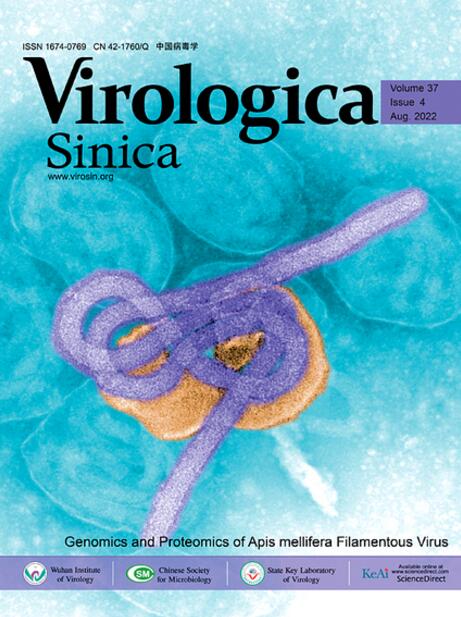乙型流感病毒血凝素蛋白的抗原分析。
IF 4
3区 医学
Q1 Medicine
引用次数: 0
摘要
乙型流感病毒(IBV)主要感染人类,是人类呼吸道感染的常见病因。为了系统分析乙型流感病毒血凝素(HA)蛋白的抗原性,研究人员从全球流感数据共享倡议(GISAID)中筛选出31株乙型/维多利亚和19株乙型/山形具有代表性的流行毒株,并利用水泡性口炎病毒系统构建了伪型病毒。豚鼠接种了三剂七种 IBV 疫苗株的疫苗(一剂 DNA 疫苗和两剂伪型病毒疫苗),并检测了针对伪型病毒的中和抗体。通过比较不同疫苗株之间的差异,我们在疫苗株 BV-21 的基础上构建了几种含有不同突变的伪型病毒。疫苗毒株对当年流行的病毒毒株显示出良好的中和水平,中和滴度从 370 到 840 不等,而对往年流行病毒的中和水平则下降了 1-10 倍。B/Victoria和B/Yamagata的每个高频流行株不仅能诱导高中和滴度,而且对不同年份的病毒株具有广泛的中和作用,中和滴度从1000到7200不等。研究发现,R141G、D197N 和 R203K 会影响 IBV 的抗原性。本研究采用假病毒系统监测高发流行株与世界卫生组织推荐的疫苗株的交叉中和效力。此外,我们还发现了三个会严重影响 B/Victoria 疫苗株抗原性的突变位点。这些突变位点为将来选择和设计通用的 IBV 疫苗株提供了有价值的参考。本文章由计算机程序翻译,如有差异,请以英文原文为准。
Antigenic analysis of the influenza B virus hemagglutinin protein
Influenza B viruses (IBVs) primarily infect humans and are a common cause of respiratory infections in humans. Here, to systematically analyze the antigenicity of the IBVs Hemagglutinin (HA) protein, 31 B/Victoria and 19 B/Yamagata representative circulating strains were selected from Global Initiative of Sharing All Influenza Data (GISAID), and pseudotyped viruses were constructed with the vesicular stomatitis virus system. Guinea pigs were immunized with three doses of vaccines (one dose of DNA vaccines following two doses of pseudotyped virus vaccines) of the seven IBV vaccine strains, and neutralizing antibodies against the pseudotyped viruses were tested. By comparing differences between various vaccine strains, we constructed several pseudotyped viruses that contained various mutations based on vaccine strain BV-21. The vaccine strains showed good neutralization levels against the epidemic virus strains of the same year, with neutralization titers ranging from 370 to 840, while the level of neutralization against viruses prevalent in previous years decreased 1–10-fold. Each of the high-frequency epidemic strains of B/Victoria and B/Yamagata not only induced high neutralizing titers, but also had broadly neutralizing effects against virus strains of different years, with neutralizing titers ranging from 1000 to 7200. R141G, D197 N, and R203K were identified as affecting the antigenicity of IBV. These mutation sites provide valuable references for the selection and design of a universal IBV vaccine strain in the future.
求助全文
通过发布文献求助,成功后即可免费获取论文全文。
去求助
来源期刊

Virologica Sinica
Biochemistry, Genetics and Molecular Biology-Molecular Medicine
CiteScore
7.70
自引率
1.80%
发文量
3149
期刊介绍:
Virologica Sinica is an international journal which aims at presenting the cutting-edge research on viruses all over the world. The journal publishes peer-reviewed original research articles, reviews, and letters to the editor, to encompass the latest developments in all branches of virology, including research on animal, plant and microbe viruses. The journal welcomes articles on virus discovery and characterization, viral epidemiology, viral pathogenesis, virus-host interaction, vaccine development, antiviral agents and therapies, and virus related bio-techniques. Virologica Sinica, the official journal of Chinese Society for Microbiology, will serve as a platform for the communication and exchange of academic information and ideas in an international context.
Electronic ISSN: 1995-820X; Print ISSN: 1674-0769
 求助内容:
求助内容: 应助结果提醒方式:
应助结果提醒方式:


